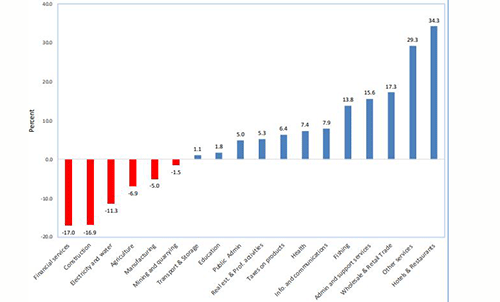Tertiary industries, also known as the services sector, pulled the domestic economy out of the doldrums after suffering through four successive quarters of negative growth. This means the Namibian economy has moved into positive territory for the first time since the fourth quarter of 2019.
This is according to the Namibia Statistics Agency (NSA)’s latest figures that indicate the real gross domestic product (GDP) rose by 1.6% during the second quarter of 2021, compared to a significant decline of 11.6% recorded in the same quarter of 2020.
“The suppressed economic activities in the corresponding period of 2020 have lowered the usual baseline of the overall economy and in particular for most sectors of the economy. The positive performances were observed in the hotels and restaurants sector due to relaxation of Covid-19 regulations coupled with the rollout of Covid-19 vaccines,” explained Alex Shimuafeni, Statistician General at NSA.
The hotels and restaurants sector registered solid growth of 34.3% in real value-added while the wholesale and retail sector grew by 17.3% as economic activities regained momentum.
Shimuafeni further stated that the administrative and support services sector posted positive performance of 15.6% in real value-added, following improved international and domestic passenger arrivals. The NSA figures further show that the fishing sector posted a strong performance of 13.8% arising from improved landings in demersal and mid-water fisheries.
The much-anticipated growth in the economy was observed across most sectors except for agriculture and forestry, mining and quarrying, manufacturing, water and electricity, construction and financial services sectors.
However, the financial sector posted the steepest contraction of 17% in real value-added compared to a decline of 12.2% registered in the same quarter of 2020. The sluggish performance is stemming from the decline in total deposits and claims in the banking services sector, cancellation of policies and low demand for new insurance policies.
“Year-on-year total deposits made by all sectors dropped by 2% during the period under review while the total stock of deposits stood at N$118.4 billion compared to N$120.8 billion recorded in the same quarter of 2020,” reads the report. Furthermore, claims by the central government in the second quarter of 2021 increased by 21.7%, to N$34.4 billion in comparison to N$28.3 billion of the corresponding periods.
Despite the hotels and restaurants sector recording the strongest growth of 34.3%, this sector could only contribute 0.4 percentage points to the GDP growth rate of 1.6%. The largest positive contributor to the GDP growth of 1.6% during the period under review was recorded by the wholesale and retail sector that posted 1.5 percentage points to overall GDP performance.


